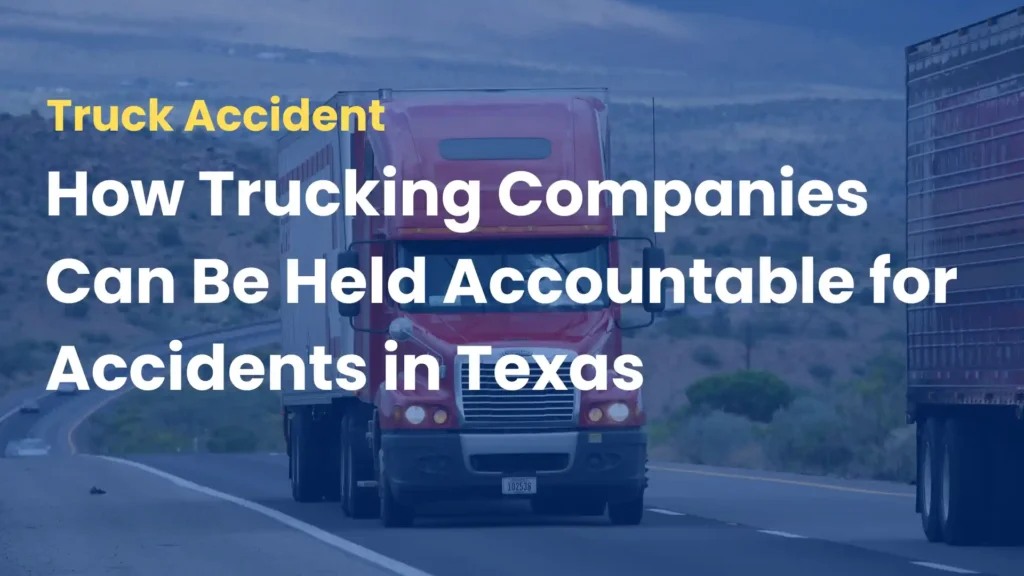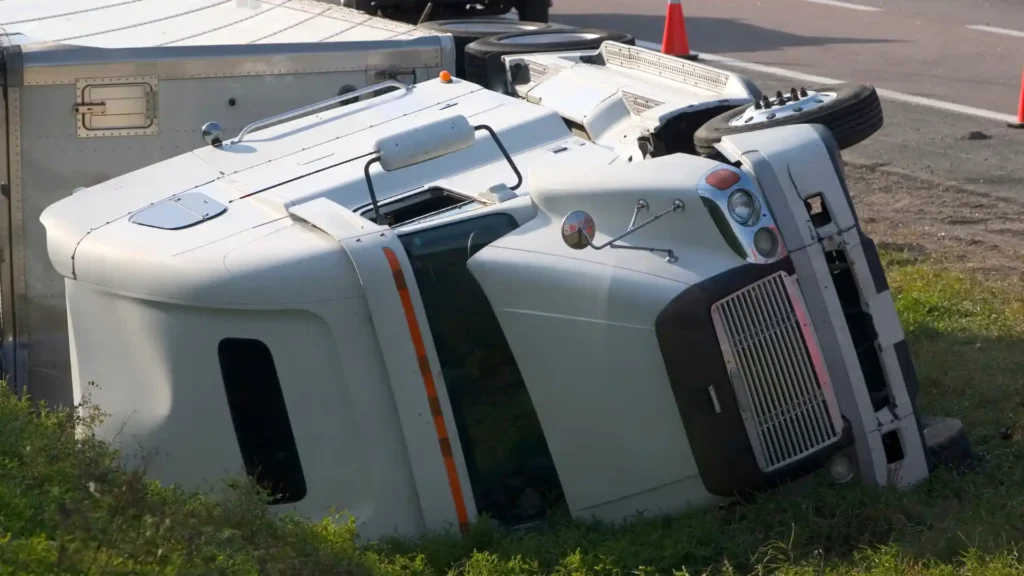
Trucking companies often contribute to accidents in Texas, but proving a personal injury case against them is challenging. These companies have vast resources and know how to manipulate the system to their benefit. Holding trucking companies accountable in Texas requires persistence and help from an experienced attorney.
When Is a Trucking Company Liable in a Texas Accident?
Some situations where a trucking company might be liable for an accident in Texas include:
- Negligent hiring and retention – Trucking companies sometimes hire drivers without confirming their commercial driver’s licenses, training history, or past safety violations. A trucking company can also be liable for a crash if it employs drivers with multiple accidents, traffic citations, or strong evidence of unsafe driving habits.
- Inadequate training and supervision – Trucking companies may fail to instruct their employees on safely handling large vehicles or complying with federal trucking regulations. Their liability can increase if managers don’t monitor driver logs, performance records, or GPS data to correct unsafe practices.
- Poor vehicle maintenance – Skipping required inspections, delaying repairs, or ignoring manufacturer recalls can lead to dangerous mechanical failures that often cause truck accidents. These safety issues may include brake malfunctions, tire blowouts, or steering problems. A company that allows trucks to operate in unsafe conditions may be responsible for resulting crashes.
- Improper cargo loading – Unbalanced, unsecured, or overloaded cargo can make a truck unstable, increase its stopping distance, or cause a rollover. A trucking company can be liable if it allows unsafe loading practices or fails to train staff in securing cargo properly.
- Pressure to violate safety rules – Setting unrealistic delivery schedules or pay incentives may encourage drivers to speed, skip rest breaks, or exceed work hour limits. These practices increase the likelihood of fatigue-related or high-speed collisions.
- Failure to address known hazards – Ignoring reports about unsafe equipment, risky routes, or hazardous company policies can create foreseeable dangers. If management fails to correct these issues, the company may share responsibility for accidents linked to those dangers.
Common Ways Trucking Companies Try to Avoid Responsibility
Some common strategies trucking companies use to avoid liability for crashes include:
- Shifting blame to others – A trucking company may argue that the truck driver, another motorist, or poor road conditions caused the crash. They might also blame shippers, cargo loaders, or outside maintenance contractors to reduce their share of fault.
- Disguising the employment relationship – Some companies classify drivers as independent contractors rather than employees. This tactic lets companies distance themselves from their drivers’ actions, even when company policies or decisions contributed to the accident. As a result, disputes over a driver’s status can delay claims and complicate the liability question.
- Withholding or altering key evidence – Trucking companies sometimes withhold, edit, or destroy crucial evidence like maintenance logs, driver qualification files, and hours-of-service records. In some cases, they delay releasing black box data or dashcam footage. These tactics make it harder to link a company’s safety violations or careless actions to the collision.
- Minimizing the severity of injuries – The trucking company may challenge victims’ medical records or argue their injuries stem from pre-existing conditions instead of the crash. The company might also suggest that a victim’s recovery was quicker than reported, reducing their potential compensation.
- Framing mechanical failure as unavoidable – A trucking company might argue that a tire blowout, brake failure, or other defect happened suddenly and without warning. Companies often use this defense even when the issue could have been detected through proper inspections or maintenance.
- Pushing early, low-value settlements – Lastly, trucking companies often make quick settlement offers before an injured party fully understands their injuries and financial losses. This strategy aims to close the case cheaply while avoiding further investigation into the company’s negligent practices.
What Evidence Helps Prove Trucking Company Fault?
One reason to hire a truck accident attorney is that trucking companies often hold onto evidence implicating them in crashes. A lawyer can act quickly to prevent these companies from destroying or altering these records. Some evidence that could indicate a trucking company is liable for a collision includes:
Driver Qualification and Employment Records
These files can show whether the company properly vetted and trained the driver. Employment applications, background checks, and licensing documents reveal if the driver met legal requirements. Similarly, records of prior accidents, violations, or disciplinary actions may reveal patterns of negligence, making it clear why holding trucking companies accountable for unsafe practices is essential to protect future drivers and passengers.
Hours-of-Service Logs
Driver fatigue is common in truck crashes, and companies sometimes encourage drivers to push their limits. Driver logbooks, electronic logging device (ELD) data, and dispatch records can reveal violations of federal rest requirements. Comparing these logs with GPS or fuel receipts can uncover falsified entries.
Vehicle Maintenance and Inspection Records
Maintenance logs and inspection reports can show whether the truck operated safely and received regular maintenance. Gaps in scheduled repairs or ignored safety issues can indicate negligence by the trucking company. These records may also link mechanical failures directly to poor oversight.
Cargo Loading and Weight Records
Improper loading or overloading can cause instability, longer stopping distances, and rollovers. Bills of lading, weight tickets, and loading diagrams show how a truck’s cargo was distributed and secured. Evidence of unsafe loading practices may indicate a trucking company’s liability for a collision.
What Compensation Can Victims Recover in Texas?
 With proper legal support, your truck accident claim could include compensation for:
With proper legal support, your truck accident claim could include compensation for:
- Current and future medical expenses
- Lost income and reduced future earnings
- Pain and suffering
- Emotional distress
- The cost to repair or replace your car or other damaged property
Contact Our Dallas Truck Accident Lawyers Now for Help
The Wilhite Law Firm has successfully fought for accident victims for nearly 50 years. We’ve helped our clients recover millions of dollars to rebuild their lives. Our truck accident attorneys in Dallas know how trucking companies try to dodge liability for crashes and how to counter their strategies. Our team is here to help you understand your rights and take the first step toward securing the necessary benefits. You don’t owe any attorney fees unless you recover compensation, so call 303-466-3529 now or complete our contact form for a free consultation.
Related Post
When Can You Sue the Trucking Company After a Texas Truck Accident?
















